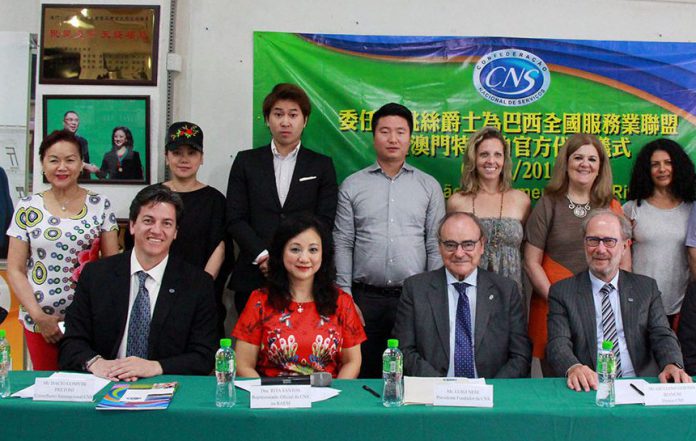The decrease of manufacturing’s participation in China and other countries’ GDPs, and the rise of services’ contribution over the last years, is a trend to be closely scrutinized according to Luigi Nese, President of the National Confederation of Services (CNS) of Brazil.
“In Brazil, it is not more than 10 per cent of the total,” said Mr. Nese on the sidelines of the event marking the nomination of Rita Santos as the Official Representative of CNS in Macau, held yesterday.
In her pronouncement, Mrs. Santos explained that, while performing her functions in the Forum Macau, she realized that “the relationships between Macau and Brazil were not very developed, and we started developing some contacts already in 2010.”
In reply to press enquiries, she said that she does not believe that CNS’s mission and her new role within the confederation will overlap with Forum Macau.
“These are two different things. The Forum is an official entity. My role with this nomination is to act as a facilitator for Brazilian entrepreneurs who wish to contact Macau and mainland Chinese businesses, and vice-versa,” she commented.
The confederation’s relationship with Macau and China started in 2012, with its participation in the China Beijing International Fair for Trade in Services (CIFTIS). That same year, CNS signed a protocol with the Macau Trade and Investment Institute (IPIM).
“Rita Santos introduced us to IPIM, and we signed a protocol with them, and we want to implement more initiatives. For the moment, we work more with prospects, but with time, we hope these translate into effective business,” said Mr. Nese.
The confederation, which has regularly participated in CIFTIS since 2012, has signed ten new protocols this year, according to its president.
Previously signed protocols were with a technology institution in Shenzhen, and another similar institute in Beijing.
Brazil-Macau-China business
The main sectors of activity represented by CNS are IT companies, events promotion, telemarketing, tourism, and cultural activities.
“We are trying to establish a stronger relationship in services with companies in Beijing, but we would like it to be done more regularly through Macau,” explained Mr. Nese.
He also believes that one of the strongest relationships that they can implement quickly is in the field of tourism.
“We would like to enable the tourism sector in Brazil to receive more Chinese, and improve the quality of services in Brazil to cope with Chinese visitors. […] We also want to advertise Brazilian culture in China, such as samba, and soccer, which are important elements to attract people to Brazil.”
According to Mr. Nese, no Macau companies are yet involved in the initiative. He argued, though, that there is a will to seek through Macau, easier access in business relations, since Portuguese and Chinese are official languages in the MSAR.
The confederation, created in Brazil in 2008, brings together six federations and 60 unions from different service sectors, representing more than 400,000 companies.
























